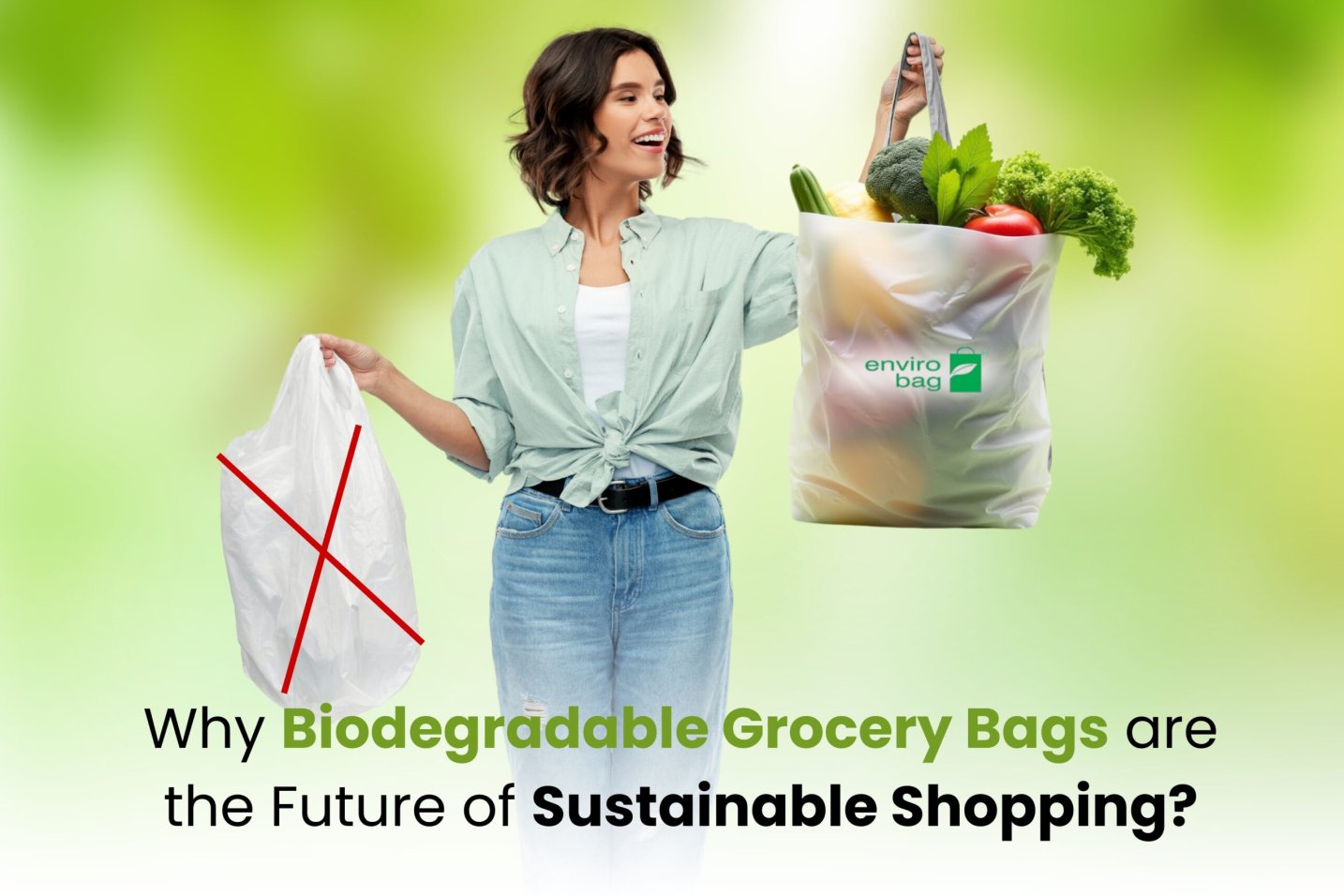Sustainability is more than just a trend—it’s the way forward. More people and businesses are realizing the importance of using eco-friendly grocery bags instead of plastic ones. If we want a cleaner planet, we need better alternatives, and that’s where biodegradable grocery bags come in.
Why Plastic Bags Are a Problem?
Plastic bags have been around for decades, causing severe environmental damage. They take hundreds of years to break down, pollute our oceans, harm wildlife, and create microplastics that enter our food and water.
Did you know that more than 1 trillion plastic bags are used every year worldwide? Many end up in landfills or water bodies, where they stay for generations. This is why many countries have banned plastic bags and encouraged businesses to switch to eco-friendly grocery bags.
The Hidden Costs of Plastic Bags
In addition to damaging the environment, plastic bags also affect economies. Governments incur millions of dollars in cleaning up plastic trash, and companies are penalized for using non-biodegradable packaging. Plastic trash also blocks drainage systems, leading to flooding in cities. By converting to biodegradable grocery bags, companies can save money and help create a cleaner world.
What Are Biodegradable Grocery Bags?
Biodegradable grocery bags are a great alternative to plastic bags. They are made from materials that break down naturally without harming the environment. These bags decompose over time, turning into organic matter instead of harmful microplastics.
Some common materials used in biodegradable bags include:
- Cornstarch-based polymers – A natural and renewable material.
- Compostable bioplastics – Breaks down in industrial composting facilities.
- Recycled paper – A sturdy, biodegradable, and reusable option.
- Algae-based materials – An innovative, ocean-friendly choice.
Many retailers also use Post-Consumer Recycled (PCR) materials, which means they recycle old plastic waste into eco-friendly grocery bags instead of dumping it.
What Are PCR and Compostable Bags?
Businesses are adopting two sustainable packaging solutions: PCR (Post-Consumer Recycled) packaging and compostable bags.
1. PCR (Post-Consumer Recycled) Packaging
PCR packaging reuses plastic waste instead of making new plastic. This method helps reduce pollution and lowers the need for new plastic production. Some benefits of PCR packaging include:
- Reducing landfill waste by recycling old plastic.
- Lowering carbon emissions by cutting down plastic production.
- Providing a durable and reusable alternative to plastic bags.
- Supporting the circular economy by reusing materials.
Many brands now incorporate PCR materials into eco-friendly grocery bags, making them practical and sustainable.
2. Compostable Bags – A Smart Choice for FMCG Brands
Compostable bags go a step beyond biodegradable ones. In composting conditions, they completely break down within 90 to 180 days, leaving zero waste behind. Key advantages of compostable bags include:
- Made from plant-based materials like cornstarch.
- No toxic chemicals or microplastics are left behind.
- Perfect for food packaging, grocery shopping, and waste disposal.
- Meets global sustainability certifications like ASTM D6400.
For FMCG brands, switching to compostable bags helps them lower their environmental impact while keeping up with customer demand for greener products.
Why Businesses Should Switch to Eco-Friendly Grocery Bags?
Moving to biodegradable grocery bags isn’t just good for the planet—it’s good for business, too. Here’s why:
1. Consumers Want Sustainable Products
Shoppers today care about sustainability. Surveys show that 73% of consumers prefer to buy from brands that use eco-friendly grocery bags and packaging. When businesses offer greener options, they attract loyal, environmentally conscious customers.
2. Government Regulations Are Getting Stricter
Most cities and nations have begun prohibiting plastic bags. Companies that fail to comply risk heavy fines or bans. Using biodegradable grocery bags keeps companies one step ahead of the law while creating a more environmentally friendly image.
3. Sustainability Builds a Strong Brand Image
A company that uses sustainable packaging is seen as responsible and future focused. Brands that use biodegradable grocery bags earn consumer trust and position themselves as leaders in sustainability.
4. Long-Term Cost Savings
Even though switching to eco-friendly grocery bags may cost a little more at first, businesses save money in the long run by reducing waste management costs, taxes on plastic use, and environmental fees.
5. Lower Carbon Footprint
Traditional plastic bags produce high carbon emissions. Biodegradable grocery bags use fewer fossil fuels and break down naturally, making them a better choice for the planet.
6. Meeting Industry Trends and Market Expectations
Green packaging isn’t a fad—it’s the future of retail. Big-box and grocery stores are already changing to environmentally friendly packaging, and consumers anticipate other companies following suit. Implementing biodegradable grocery bags is one-way companies can align with these industry standards and remain competitive.
What’s Next for Sustainable Shopping?
The future of retail and FMCG packaging is moving towards sustainable shopping. Consumers, brands, and governments are cooperating to make biodegradable grocery bags the new normal. Developments in PCR technology and compostable material will keep expanding, making environmentally friendly packaging cheaper and more accessible.
Businesses that switch to sustainable packaging will stay competitive, meet customer demands, and help reduce plastic waste. It’s a win-win situation for both brands and the environment.
How Can Consumers Support the Green Movement?
While businesses are making changes, consumers also have a role in reducing plastic waste. Here are a few simple steps everyone can take:
- Bring reusable eco-friendly bags when out shopping.
- Select brands that have biodegradable shopping bags and eco-friendly packages.
- Dispose of recyclable and compostable bags so they will decompose properly.
- Urge local markets and supermarkets to embrace more sustainable packaging practices.
At Enviro Bag, we are committed to providing high-quality, environmentally friendly packaging. Our range of biodegradable and eco-friendly grocery bags helps businesses reduce their environmental footprint while staying ahead of market trends.
Join the green movement with Enviro Bag and make sustainability a part of your business today!

 Cart is empty
Cart is empty 
